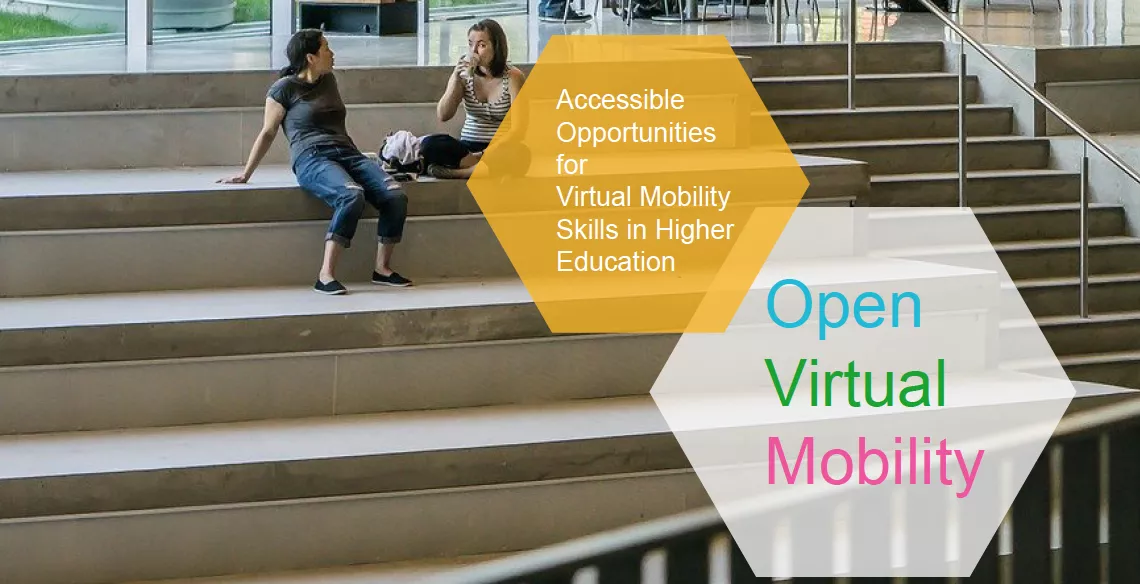Invitation to MOOCs in the Open Virtual Mobility Learning Hub

Reading time circa 5 minutes - Read, like and comment!

The Open Virtual Mobility project (abbreviated: OpenVM) is a three year (2017-2020) strategic partnership for innovation and the exchange of good practices funded by the European Erasmus+ program of the European Commission. We invite all higher education teachers to use OpenVM MOOCs in the OpenVM Learning Hub to support existing or new curricula and/or to recommend OpenVM MOOCs to students for self-learning. OpenVM MOOCs have been developed to support virtual mobility, especially in context of open education, but can be also used in other educational contexts, since the skills they support are applicable in many different areas.
What is virtual mobility?
Virtual mobility has become a valuable way of enabling international academic experiences in situations when we cannot physically travel to a university in a different country. Virtual mobility refers to a form of academic mobility in which students and teachers in higher education can study or teach by using digital tools and platforms without physically traveling to another higher education institution abroad. Virtual mobility can be used to complement physical mobility, such as Erasmus+ mobility programs1, or even replace physical mobility since no traveling is required. Education can take face-to-face, blended or online forms.
Virtual mobility can be employed by teachers and students to perform the following tasks:
- prepare for physical mobility (before traveling)
- create blended mobility (combined physical and virtual mobility)
- follow up on physical mobility (after traveling)
- participate in international mobility without physical mobility (no traveling)
The Open Virtual Mobility project
The Open Virtual Mobility project (abbreviated: OpenVM) is a three year (2017-2020) strategic partnership for innovation and the exchange of good practices founded by the European Erasmus+ program of the European Commission. Altogether ten European organizations from higher education work together in the OpenVM project. See more here https://www.openvirtualmobility.eu/about/454-partners/
One of the key outcomes of the Open Virtual Mobility project is the Open Virtual Mobility Learning Hub (OpenVM Learning Hub)2, an online learning environment for the development, assessment and recognition of virtual mobility skills in higher education.
You can login to the hub here https://hub.openvirtualmobility.eu/
The OpenVM Learning Hub and mini-MOOCs
The OpenVM Learning Hub hosts a set of eight mini-MOOCs, in each of the eight competency areas. Each mini-MOOC is dedicated to a specific competency cluster needed for successful engagement in virtual mobility. In each mini-MOOC the learner can study at one of three levels: Foundations, Intermediate and Advanced.
Learners can develop competencies in the following eight competency clusters:
- Media and digital literacy
- Active self-regulated learning skills
- Autonomy-driven learning
- Networked learning
- Intercultural skills and attitude
- Interactive and collaborative learning in an authentic international environment
- Open-mindedness
- Open virtual mobility knowledge
All OpenVM MOOCs are designed as mini- MOOCs. Mini-MOOCs are smaller, shorter, and cover less content and fewer skills than traditional MOOCs, which are much longer and can be difficult to complete. The granular structure of OpenVM mini- MOOCs addresses the engagement and motivation-loss problem in longer online courses. The series of eight mini-MOOCs aims to facilitate just-in-time and on-the-go learning.
Designing individual learning pathways
With each mini-MOOC broken down into three levels, learning pathways can be designed by individual learners depending on their initial and intended competency levels. To assess the initial level of a given skill, each mini-MOOC starts with a pre-assessment of competencies. Based on the results of the pre-assessment, one of the three levels is proposed to the learner, who can decide to follow a recommended pathway.
In this way learners can study in a flexible, modular manner in accordance with their own interests, needs and preferences.

Figure 1: Learning Pathways in OpenVM MOOCs
We invite all higher education teachers to use OpenVM MOOCs with students and/or to recommend OpenVM MOOCs to students for self-learning.
OpenVM MOOCs have been developed to support virtual mobility, especially in context of open education, but can be also used in other educational contexts, since the skills they support are applicable in many different areas.
If you would like to find out more, please view the OpenVM Brochure
About the author:

Articles you might also enjoy:
Für Europa eine Bereicherung: Mobilität in der Erwachsenenbildung [DE]
How to tackle the carbon footprint of European projects?
Using EPALE for virtual mobility and exchange
EPALE Community Response to COVID-19 - Share, exchange, inspire!




